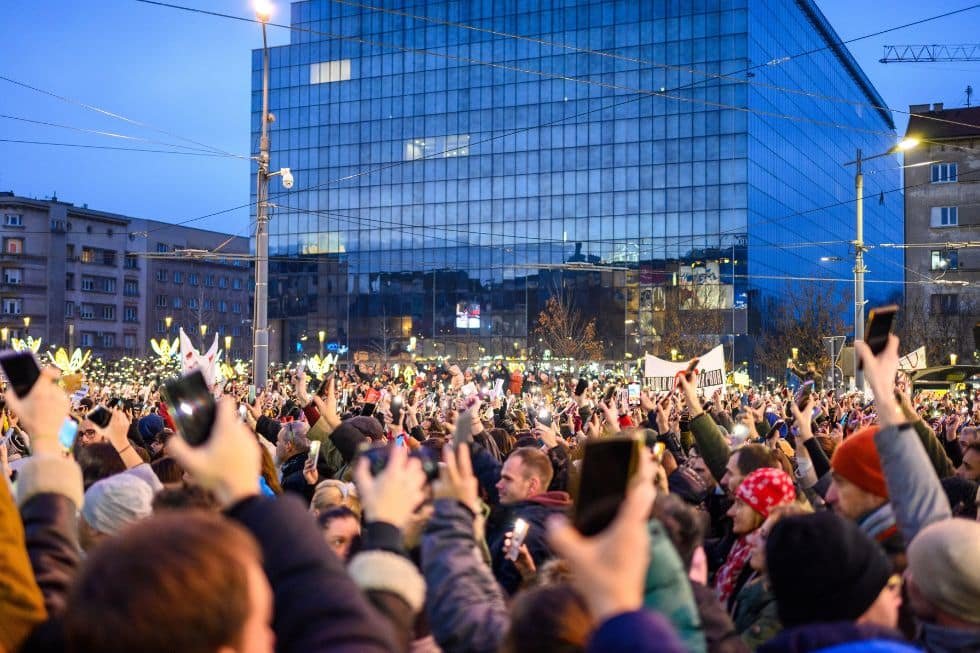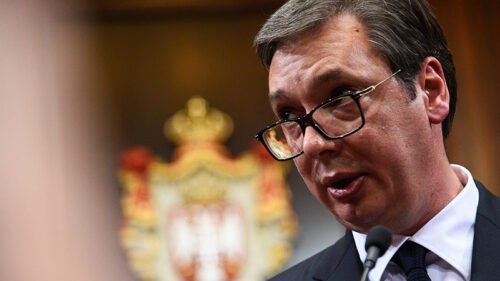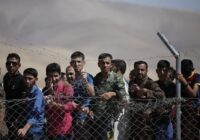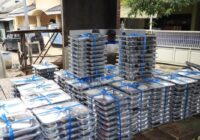Protestors in Serbia have faced increasing use of force by the police as they’ve incorporated increasing civil disobedience into their tactics. The students, who had been leading rallies until recently, issued a deadline for the government to set a date for snap elections. Once it had come and gone, they began to set up roadblocks in major cities. Despite most being dismantled by the police, protesters create another as soon as one is overturned, drawing the frustration of the authorities.
After claiming in March that “We got the message”, Serbian President Aleksandar Vučić has continued to demonize and intimidate protesters by accusing them of “being paid by foreign intelligence agencies”, assaults by government-sponsored thugs and the use of a sonic weapon during a rally.
The protests were a response to a train station canopy collapse that killed 16 people, including several children, in the city of Novi Sad last November. The renovation was part of Serbia’s railway system revitalization along the Belgrade-Budapest line. Chinese construction companies undertook the work as part of the Belt and Road initiative and formed secret contracts with leaders in Serbia.
Following the tragedy, government officials claimed the canopy was untouched during the renovation. However, Zoran Đajić, a geological engineer who consulted on stonework, said it was clear the additional weight added during construction caused the collapse. He cited aggravating factors, including workers lacking proper professional training and the omission of a public tender for the project.
Vučić hasn’t given in to any of the students’ demands and has doubled down on his usage of political figureheads to create the appearance of change. He received flak for the rushed approval of several infrastructure projects that would run contrary to the interests of Serbian citizens and ignored the warnings of EU officials by attending Russia’s annual Victory Day parade in May.
Notably absent at the protests are European Union flags, an odd contrast considering their use at similar protest movements, such as those in Georgia or Moldova. Aside from the lack of support for the protest movement, the students’ frosty attitude towards Brussels has been shaped by an apparent EU policy of prioritizing economic opportunity and alliance enlargement over democracy.
The development of a lithium mine in Western Serbia and the deal to transform a conflict memorial into a luxury hotel and residential complex have weakened citizens’ trust in the EU and the US. As reform efforts stall, the situation necessitates tactful intervention that prioritizes long-term democratic stability.
Out with the old, in with the … old?
Serbian Prime Minister Miloš Vučević reluctantly resigned a few months after the canopy tragedy as protests intensified. His replacement, Đuro Macut, is seen by many as another placeholder for a largely ceremonial role that Vučić will continue to exert control over. The investigative media outlet KRIK revealed that the day before his appointment, Macut acquired a villa worth more than one million dollars from the director of a public road construction company. This was in addition to the four other apartments he already owned.
Vučić’s political career began as a spokesperson for Vojislav Šešelj, who founded the far-right Serbian Radical Party (SRS) and is a proponent of a greater Serbia. Šešelj was convicted of crimes against humanity and served ten years for the hate speech he gave in Hrtkovci, an ethnically mixed village in the northern autonomous province of Vojvodina.
The speech consisted of reading a list of names of Croat residents that needed to leave and was followed by a campaign of ethnic cleansing that included harassment, intimidation and, in several cases, violent behaviour towards non-Serb civilians. He made similar statements against Kosovar Albanians while part of the government of Slobodan Milošević, which planned to ethnically cleanse Kosovo.
In addition to campaigning for the release of Šešelj, Vučić defended Radovan Karadzic, the former president of the Serb Republic of Bosnia. During the Bosnian War, Karadzic, with support from Milošević, instituted near-constant violence against the Bosnian Muslim population and, to a lesser extent, other ethnic minorities. The genocide in Srebrenica, where over 8,000 Bosnian Muslim men were brutally executed, is not accepted by those in Belgrade.
Serbian governments have historically downplayed and denied the genocide. Vučić himself pushed back against the UN on the subject as recently as 2024. The government and the media, monopolized by Vučić’s Serbian Progressive Party (SNS), focus on a 2015 incident where Vučić made a surprise appearance at the annual commemoration. His stunt was brief, as locals hounded him out of the town with bottles and rocks. The anger towards Vučić stemmed from his statement in parliament only days after the genocide occurred: “You kill one Serb, and we will kill 100 Muslims.”
Since becoming president, Vučić has claimed to have reformed his previously hardline views and has worked to develop a foreign policy that envisions Serbia coexisting independently of global alliances. Allowing the most powerful leader in Southeastern Europe to repeatedly violate democratic rights, as long as he peddles the language of European integration, sets a dangerous precedent.
No to authoritarians and no to the EU
Serbia has attempted to play adversaries against each other. Despite advocating for future EU accession, they’ve broken with common policy numerous times. They’ve actively ruled out imposing sanctions on Russia following their invasion of Ukraine and have been attempting to persuade countries to withdraw recognition of Kosovo.
The EU’s neutral stance on the matter is viewed as complicit by some protesters. Marta Kos, the EU’s enlargement commissioner, commented in response to a lack of progress on reforms in Serbia, “We are now assessing whether to distribute them [EU growth funds] or not.”
The EU’s hesitancy to castigate the Serbian leadership resides in its intention to open a lithium mine in the Jadar Valley. The mine would provide Europe with a major rare earth mineral supply as the demand for rechargeable batteries explodes globally. Locals have expressed concern that the proposed mine, a venture by British–Australian giant Rio Tinto, will cause irreversible damage to nearby water sources and farmland.
On Rio Tinto’s website, they have a page specifically for all the concerns surrounding the mine. Brief references to the potential loss of economic opportunity provide dim encouragement that agricultural production won’t be affected. Instead, the text is directed at promoting the tax and royalty contributions the mine could generate for local government and the state.
Citizens are acutely aware of the effects of allowing foreign governments to dictate mineral policy and preservation standards after the Chinese-majority-owned copper mine opened in Bor, a town in Eastern Serbia. The mine’s industrial pollution has harmed nearby crop production and has not produced the economic benefits promised to taxpayers by the state.
Across the Atlantic, the US President Donald Trump’s Administration has been equally admonished for seemingly ignoring continual anti-democratic abuses against Serbian citizens. A protest followed the revelation that Jared Kushner’s investment firm, Affinity Partners, had acquired the Ministry of Defense buildings that had previously been damaged during NATO’s bombing raid against Yugoslavia in 1999.
The firm had intended to turn the site, considered a memorial by some Serbian citizens, into a luxury hotel and apartment complex complete with shops and office space. Last month, the process encountered a snag when it was revealed that the “expert opinion” that facilitated the removal of the heritage designation for the buildings was forged by Goran Vasić, the acting director of the Republic Institute for the Protection of Cultural Monuments. The future of the project currently remains uncertain.
Chasing Kremlin windmills
There’s a lot of publicity surrounding the connection between Russia and Serbia. The major media outlets wax lyrical about how Orthodox roots, antagonistic politicians and football hooligan friendships are the perfect mesh. The reality, however, reveals an exchange that is more suited to each nation’s individual interests.
The myth of friendship gained full traction as Serbia sought Russia’s support to veto any resolution that came before the UN’s Security Council regarding Kosovo. The move was costly as Serbia sold the majority control of its gas company, NIS, to Russia’s Gazprom. Moscow intended to capitalize on the gas shortage in Serbia and utilize the country as an entry point to the Central European energy market.
In the November–December issue of New Eastern Europe, Natasza Styczyńska outlined how poorly constructed Western reporting helped breed acceptance of this narrative. She cited the concept of “systematic forgetting,” the idea that, despite knowing the EU was the largest provider of aid to Serbia, the media portrayed Russia as its dearest ally.
Reciprocity has been extended regarding the fast-tracking of Serbian citizenship for well-to-do members of Russia’s elite. The relationship remains useful for Russia as a means of working around ongoing EU–US sanctions. Serbia’s government will continue to eagerly accept support from Russia and China as it engages in state-capture at home, while Eastern powers have capitalized on the EU’s inability to respond promptly to faux reformers.
The stability of the soft alliance has been tested once or twice. Most recently, Vučić was on the receiving end of some hostility from Putin’s government after being accused of supplying Ukraine with war munitions through intermediary countries.
A journey marred by uncertainty
The student’s task is enormous — they aim to oust an entire political class and remain unscathed while doing so. Reprisals have already started against academic staff members who joined the protests: a government decree implemented in March cut the number of hours academics are allowed to dedicate to research per week from twenty to five.
Without enforcement mechanisms, don’t expect pro-European rhetoric alone to threaten the stability of Vučić’s regime. Although excluding them from membership discussions is unlikely, the economic potential of Serbia cannot take priority over protecting the rights of citizens. Each day of inaction equates to another individual who questions where true leadership lies.
Messaging that pledges to “listen to the students” has gotten tiresome. Using it as a tactic to stall the implementation of a comprehensive policy towards authoritarians that operate within Europe’s reach is cheap and evasive. Sole MEPs and smaller ideological collectives that don’t possess voting power have been made opaque throughout this crisis.
Civil disobedience should only be fashioned as a means to urge any semblance of accountability and not the general destruction of property. To this point, it has largely remained that way. However, the situation will need to be monitored both locally and externally.
While Vučić fashions himself as wholly reformed and continues to pack his cabinet full of corrupt undesirables, those in Brussels, Strasbourg and Washington must bid him adieu. It’s already shameful to have provided this much leeway. Ignoring willful abuses in governance so long as rare earth minerals and private real estate deals can be secured violates every promise they’ve ever made to safeguard democracy.
Gaining back the trust of the citizens they took for granted should be their sole priority.
[Casey Herrmann edited this piece]
The views expressed in this article are the author’s own and do not necessarily reflect Fair Observer’s editorial policy.
Support Fair Observer
We rely on your support for our independence, diversity and quality.
For more than 10 years, Fair Observer has been free, fair and independent. No billionaire owns us, no advertisers control us. We are a reader-supported nonprofit. Unlike many other publications, we keep our content free for readers regardless of where they live or whether they can afford to pay. We have no paywalls and no ads.
In the post-truth era of fake news, echo chambers and filter bubbles, we publish a plurality of perspectives from around the world. Anyone can publish with us, but everyone goes through a rigorous editorial process. So, you get fact-checked, well-reasoned content instead of noise.
We publish 3,000+ voices from 90+ countries. We also conduct education and training programs
on subjects ranging from digital media and journalism to writing and critical thinking. This
doesn’t come cheap. Servers, editors, trainers and web developers cost
money.
Please consider supporting us on a regular basis as a recurring donor or a
sustaining member.
Will you support FO’s journalism?
We rely on your support for our independence, diversity and quality.











Comment